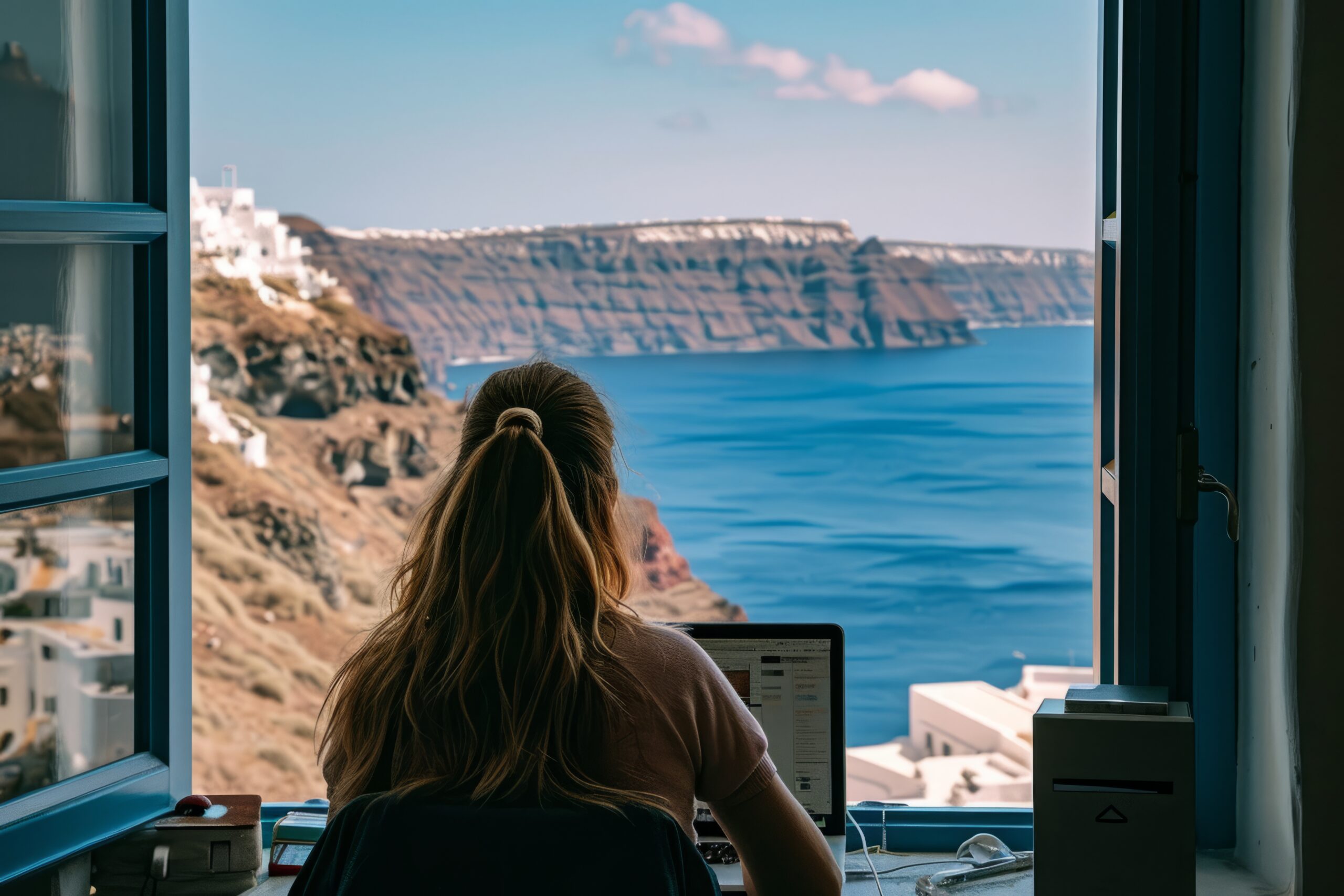Did you know that you can live in Portugal with a passive income of just €820 per month? The D7 Portuguese Visa is a gateway to sunny beaches, delicious food, and a relaxed lifestyle. It’s designed for non-EU nationals who have a stable income from sources like pensions, investments, or royalties.
This comprehensive guide will walk you through the process of applying for the D7 visa, step-by-step. We’ll cover everything from the essential requirements to the necessary documents, and even offer tips for finding accommodation and opening a bank account in Portugal.
Here’s what we’ll explore:
- D7 Visa Basics: Understanding the requirements, benefits, and eligibility criteria.
- Step-by-Step Guide: A detailed breakdown of the application process, including essential documents and timelines.
- Financial Requirements: A clear explanation of the income and savings needed for the D7 visa.
- Accommodation and Bank Accounts: Tips and resources for finding a place to live and opening a Portuguese bank account.
- Frequently Asked Questions: Answers to common questions about the D7 visa.
D7 Visa Basics: Your Gateway to Portugal
The D7 visa, officially known as the “Visa for Residence for Investment Activity,” is a golden ticket for individuals who want to live in Portugal and have a consistent passive income. This visa allows you to live and work in Portugal for an extended period, and it can ultimately lead to permanent residency and even citizenship.
Here’s a quick overview of the D7 visa:
- Eligibility: Non-EU citizens with a stable passive income of at least €820 per month after taxes.
- Duration: The initial visa is valid for 2 years and can be extended for an additional 3 years.
- Citizenship: After residing legally in Portugal for 5 years, you become eligible to apply for permanent residency.
- Family: You can apply for accompanying visas for your family members.
The D7 Visa: A Step-by-Step Guide
Step 1: Appointment at the Consulate or VFS Global
- Determine the process: Check how you should submit your documents in your country – directly at the consulate or through the VFS Global visa center.
- Register your application: Register online, providing personal information and attaching required documents. You’ll receive a PDF file with the application form.
- Complete the application form: Fill out the form using Latin letters, completing all mandatory fields marked with an asterisk (*). Avoid using symbols, including commas, in some areas.
- Select the consular office: In the “Consular Office” section, choose the Portuguese Embassy in your city/country.
- Family applications: Each family member, including minors, needs to complete a separate application form.
Step 2: Certificate of No Criminal Record
- Obtain the certificate: Request a certificate of no criminal record from your country of citizenship and any countries where you’ve lived for more than a year after the age of 16.
- Apostille and translation: Get an apostille for the certificate, translate it into Portuguese, and have it notarized by a notary.
- Validity: The certificate is valid for 90 days. If you have a criminal record, consult a lawyer.
- Important: Don’t forget to translate the certificate into Portuguese and have it notarized before submitting it.
Step 3: Get Your NIF (Tax Identification Number)
- Remotely or in person: You can obtain your NIF remotely before arriving in Portugal or in person at a Finanças office by making an appointment.
- NIF types: You can apply for a simplified NIF without a representative, which allows you to open a bank account and rent property, but not engage in active tax work. A standard NIF with a representative offers full functions.
- How to obtain it: You can get your NIF for free on your own or order it through a service for €99.
Step 4: Proof of Accommodation
- One-year rental contract: Many consulates require a one-year rental contract in Portugal.
- Official requirements: The Ministry of Foreign Affairs of Portugal’s website indicates a 4-month contract for the duration of the visa.
- Contact the consulate: It’s crucial to contact the Portuguese consulate in your country for the most up-to-date information.
- Airbnb reservations: In some countries, short-term Airbnb reservations are acceptable, while others require receipts from Finanças proving the lease is registered.
- Guarantors: Some landlords may require a guarantor residing and working in Portugal.
Documents for landlords:
- Income tax returns
- Contracts
- Motivation letter in Portuguese explaining your reason for wanting to live in Portugal and how you’ll cover expenses.
Step 5: Open a Bank Account
- Online or offline: You can open a bank account online or offline, either with a lawyer’s help or independently.
- Non-resident account: Inform the bank you want to open an account as a non-resident and submit as many documents as possible.
- Popular banks in Portugal:
- Caixa Geral de Depósitos
- Banco Santander Totta
- Novo Banco
- ActivoBank Portugal
- Caixa Central de Crédito Agrícola
- If a bank refuses: Don’t worry! This is common in Portugal. Try another bank or office of the same bank. You can apply for a visa with a non-Portuguese account, but keep all refusal documents to justify the need for an account.
Step 6: Proof of Passive Income
- Minimum income: The minimum monthly income for 2024 is €820 after taxes.
- Family applications: If you’re applying with your family, you’ll need to show a higher income: 50% of the minimum wage for an adult spouse and 30% for each child.
- Examples of passive income: Rental earnings, dividends from a business, copyright income, royalties, etc.
- Transparency and predictability: The consulate needs to verify the source and basis of your income. Provide contracts, tax statements, and bank statements.
- Ways to prove your income:
- Bank statement for the year
- Portuguese bank account balance with €16,000 or more
- Rental contract (if you’re a landlord)
- Dividends from stocks, business, or royalties
- Interest from the bank
Step 7: Savings for the Visa
- Official requirements: The official requirements for the Digital Nomad visa don’t mention mandatory savings.
- Recommended savings: Some countries recommend showing at least €9,840 per person.
- Higher savings: To increase your chances of approval, aim for a deposit of 12-16 thousand euros.
- Family applications: You’ll need to show half the amount for your spouse (0.5 x €820 x 12 months) and one-third for each underage child (0.3 x €820 x 12 months).
- Bank statement: You’ll need a bank statement in English, stamped by the bank.
- Check consulate requirements: Some consulates require savings exclusively in Portuguese accounts.
Step 8: Health Insurance
- D visa insurance: Standard travel insurance for 120 days is sufficient.
- Residency permit insurance: You’ll need Portuguese insurance for your residency permit.
- Insurance options: Tranquilidade, Fidelidade, and others.
- Cost: As low as €8 per month.
- Bank insurance: You may be able to obtain insurance through your Portuguese bank.
Step 9: Tickets to Portugal
- Ticket reservations: You don’t need to buy actual tickets, just show proof of reservations for your planned arrival date.
- Reservation date: Aim for reservations 1.5-2 months after your visa application date.
- Date flexibility: The exact date on the tickets doesn’t affect the visa processing speed.
Step 10: Motivation Letter
- Optional but helpful: A well-written motivation letter can positively impact your application.
- What to include:
- Briefly describe your source of income, reason for choosing Portugal, and future plans.
- List the attached documents.
- Explain how you plan to financially support yourself.
- Highlight your background, skills, and reasons for choosing Portugal.
- Consider a lawyer: A lawyer can help you draft a more convincing letter with references to relevant laws and regulations.
Step 11: Application to the Consulate or VFS
- Make an appointment: Schedule an appointment at the consulate or VFS.
- Mail submission: In some countries, you can send your documents by mail.
- Processing time: Allow 1-2 months (up to 6 months in some countries).
- In-person application: Arrive 15-20 minutes early for your appointment.
- Document requirements: Ensure all documents are translated, certified, and apostilled.
- Check the questionnaire: Make sure to update the questionnaire (in the PDF editor) if any information has changed.
- Application fee: €80 (can vary depending on your country).
Step 12: Come to Portugal and Apply to AIMA
- D visa validity: Your D visa is valid for 120 days and allows you to enter the EU twice during that time frame.
- AIMA appointment: You’ll be scheduled to visit the AIMA. If you don’t have a scheduled appointment, make one yourself.
- Arrival date: Arrive in Portugal while your visa is still valid, even if your AIMA appointment is after the visa expiration date.
- Rescheduling: Call the AIMA at 217 115 000 to reschedule if needed.
- AIMA fee: €170.5, payable by bank card.
- Residency permit card: You’ll receive your residency permit card in the mail 2-12 weeks after your AIMA appointment. It will be valid for 2 years.
Documents for AIMA:
- Passport with your visa
- NIF
- Proof of accommodation
- Recent bank account statement (often requires a Portuguese bank account)
- Proof of income
- NISS, utente (optional)
- For family reunion: recent copies of family certificates, bank statements, and the residence permit of the family member.
- For D3: translated and apostilled diploma of higher education.
Financial Requirements for the D7 Visa
Income:
- Minimum monthly income: €820 after taxes.
- Family applications:
- Spouse: 50% of the minimum wage (€820 x 0.5 = €410)
- Each child: 30% of the minimum wage (€820 x 0.3 = €246)
Savings:
- Official requirements: No specific amount is mentioned, but it’s recommended to show at least €9,840 per person.
- Recommended savings: Aim for a deposit of 12-16 thousand euros to increase your chances of approval.
- Family applications:
- Spouse: €9,840 x 0.5 = €4,920
- Each child: €9,840 x 0.3 = €2,952
Important: Check the requirements of your consulate, as some may require savings exclusively in Portuguese accounts.
Finding Accommodation and Opening a Bank Account in Portugal
Accommodation:
- Rental contracts: Many consulates require a one-year rental contract, but official requirements indicate a 4-month contract.
- Contact the consulate: Get the most up-to-date information from the Portuguese consulate in your country.
- Resources for finding apartments:
- Idealista
- Imovirtual
- CustojustoCasa
- SapoBQuarto
- Flatio
- Uniplaces
- Nestpick
Bank Accounts:
- Open an account: You can open a bank account online or offline, either independently or with the help of a lawyer.
- Non-resident account: Inform the bank you want to open an account as a non-resident.
- Popular banks in Portugal:
- Caixa Geral de Depósitos
- Banco Santander Totta
- Novo Banco
- ActivoBank Portugal
- Caixa Central de Crédito Agrícola
- Bank refusals: Don’t worry if a bank refuses. Try another bank or office of the same bank. You can apply for a visa with a non-Portuguese account.
Frequently Asked Questions about the D7 Visa
Q: Can I work in Portugal with a D7 visa?
A: The D7 visa is primarily for passive income holders. You can’t work in Portugal with a D7 visa unless you apply for a separate work visa. However, you can engage in freelance work or start a business.
Q: How long does it take to get a D7 visa?
A: The processing time for a D7 visa is typically 1-2 months, but it can take up to 6 months in some countries.
Q: Can I apply for the D7 visa from Portugal?
A: No, you must apply for the D7 visa from your country of citizenship or a country where you already hold a residence permit.
Q: What are the benefits of getting a D7 visa?
A: The D7 visa allows you to live and work in Portugal for an extended period, and it can lead to permanent residency and citizenship. You also get access to Portugal’s healthcare system, education system, and social security.
Q: What are the risks of applying for the D7 visa?
A: The biggest risk is that your application will be rejected. Make sure you meet all the requirements and submit all the necessary documents.
Q: What happens if my D7 visa is rejected?
A: If your D7 visa is rejected, you can appeal the decision. You can also reapply for the visa, but you’ll need to address the reasons for the rejection.
Q: What are the next steps after receiving my D7 visa?
A: Once you receive your D7 visa, you’ll need to schedule an appointment with the AIMA (Serviço de Estrangeiros e Fronteiras) to apply for your residency permit card.
Bottom line
The D7 visa is a great option for individuals with a stable passive income who want to live in Portugal. By following the steps outlined in this guide, you can increase your chances of getting approved for this visa and enjoying all the benefits it offers.
Move to Portugal 🇵🇹 with Confidence!
🔥 Get Personalized Visa Guidance from Experts
Start your Portugal journey with a personalized consultation and get clear answers to your questions.
Resources
Visa and Immigration Services
🌐 VFS Global: For global visa and passport application services. Visit VFS Global
📝 Portugal Visa Application: Official portal for online visa applications in Portugal. Apply for a Visa
Real Estate and Housing
🏡 Idealista: Find apartments and houses for rent or sale in Portugal. Visit Idealista
🏠 Imovirtual: Search for properties to buy or rent in Portugal. Visit Imovirtual
💼 CustoJusto: Classified ads for real estate and other categories in Portugal. Visit CustoJusto
🛏️ Casa Sapo: Rent rooms and apartments in Portugal. Visit Casa Sapo
Short-term and Student Accommodation
🏢 Flatio: Medium-term rentals and accommodation options in Portugal. Visit Flatio
🎓 Uniplaces: Find student accommodation and rooms for rent in Portugal. Visit Uniplaces
🌍 Nestpick: Search for furnished apartments and rooms worldwide. Visit Nestpick





